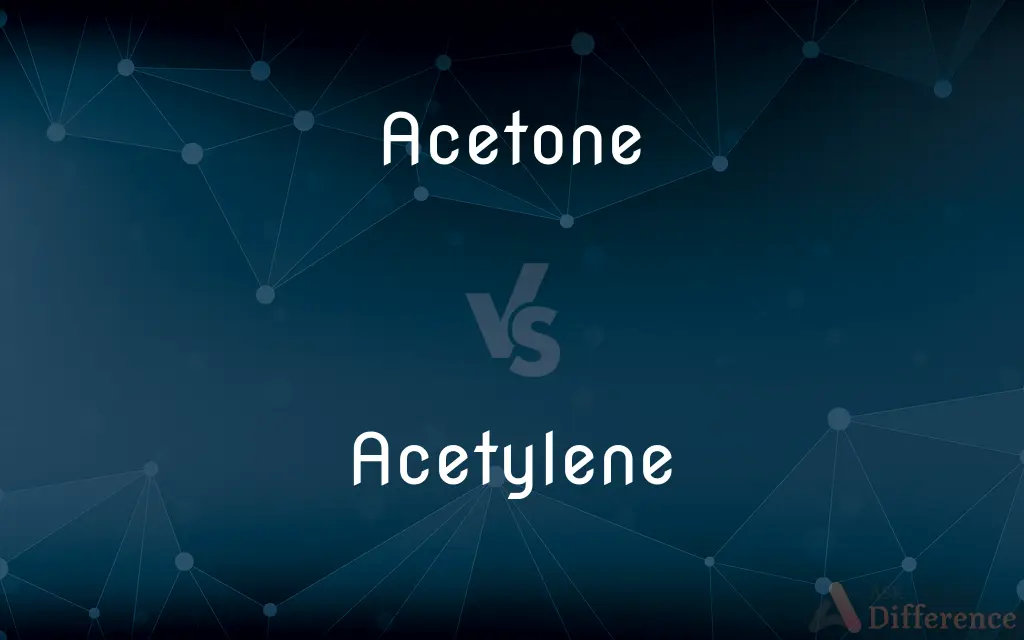Acetone vs. Acetylene — What's the Difference?
By Fiza Rafique & Maham Liaqat — Updated on March 11, 2024
Acetone is a solvent used in various industries, while acetylene is a gas used for welding and cutting metals.

Difference Between Acetone and Acetylene
Table of Contents
ADVERTISEMENT
Key Differences
Acetone is a volatile, flammable liquid commonly used as a solvent in the manufacturing of plastics and other industrial products. It is known for its effectiveness in removing paints and coatings. On the other hand, acetylene is a highly flammable gas, utilized primarily in welding and metal cutting due to its high flame temperature.
Acetone is also employed in the pharmaceutical and cosmetic industries, valued for its ability to dissolve a wide range of substances. Whereas acetylene finds use in the chemical synthesis of a variety of organic compounds, highlighting its versatility beyond welding.
In terms of safety, acetone's main hazards are related to its flammability and potential to cause skin irritation. In contrast, acetylene poses risks of explosion under certain conditions, making its handling more hazardous.
Environmental impact is another point of differentiation. Acetone evaporates quickly, reducing long-term environmental risks, but contributing to air pollution. Acetylene, while not a direct pollutant, requires careful disposal and control to prevent accidental release, which could pose hazards.
In the laboratory, acetone is often used as a cleaning agent for glassware due to its evaporative properties. Acetylene, however, is rarely used in laboratory settings outside of specific synthesis processes or as a fuel gas for atomic absorption spectroscopy.
ADVERTISEMENT
Comparison Chart
Type
Liquid solvent
Flammable gas
Primary Use
Solvent in manufacturing, cosmetics
Welding, cutting metals
Safety Hazards
Flammability, skin irritation
Explosive under pressure, flammability
Environmental Impact
Evaporates quickly, potential air pollutant
Requires careful handling to prevent release
Industrial Use
Plastics, pharmaceuticals
Metal fabrication, chemical synthesis
Compare with Definitions
Acetone
Solvent.
Acetone is used to clean surfaces before painting.
Acetylene
Welding Gas.
Acetylene is used in oxy-acetylene welding for its high flame temperature.
Acetone
Cosmetic Use.
Acetone is a common ingredient in nail polish remover.
Acetylene
Safety Measures.
Acetylene cylinders must be stored upright to prevent accidents.
Acetone
Pharmaceutical Ingredient.
Acetone is used in some pharmaceutical formulations.
Acetylene
Lighting.
Before electric lights, acetylene was used in lamps for lighting.
Acetone
Industrial Cleaner.
Acetone cleans machinery in manufacturing processes.
Acetylene
Cutting Torch Fuel.
Acetylene cuts through metals with precision in industrial settings.
Acetone
Safety Precautions.
When handling acetone, use gloves to prevent skin irritation.
Acetylene
Chemical Synthesis.
Acetylene is a building block for synthetic rubber.
Acetone
Acetone, or propanone, is an organic compound with the formula (CH3)2CO. It is the simplest and smallest ketone. It is a colourless, highly volatile and flammable liquid with a characteristic pungent odour.
Acetylene
Acetylene (systematic name: ethyne) is the chemical compound with the formula C2H2. It is a hydrocarbon and the simplest alkyne.
Acetone
A colorless, volatile, extremely flammable liquid ketone, C3H6O, widely used as an organic solvent. It is one of the ketone bodies that accumulate in the blood and urine when fat is being metabolized.
Acetylene
A colorless, highly flammable or explosive gas, C2H2, used for metal welding and cutting and as an illuminant. Also called ethyne.
Acetone
(organic compound) A colourless, volatile, flammable liquid ketone, (CH3)2CO, used as a solvent.
Acetylene
Any organic compound having one or more carbon–carbon triple bonds; an alkyne.
Acetone
A volatile liquid consisting of three parts of carbon, six of hydrogen, and one of oxygen; pyroacetic spirit, - obtained by the distillation of certain acetates, or by the destructive distillation of citric acid, starch, sugar, or gum, with quicklime.
Acetylene
Ethyne; the simplest alkyne, a hydrocarbon of formula HC≡CH. It is a colourless, odorless, extremely flammable, explosive gas, formerly used as an illuminating gas, but now used in welding and metallurgy.
Acetone
The simplest ketone; a highly inflammable liquid widely used as an organic solvent and as material for making plastics
Acetylene
A lamp powered by acetylene, particularly a motor vehicle headlight.
Acetylene
A gaseous compound of carbon and hydrogen, in the proportion of two atoms of the former to two of the latter. It is a colorless gas, with a peculiar, unpleasant odor, and is produced for use as an illuminating gas in a number of ways, but chiefly by the action of water on calcium carbide. Its light is very brilliant.
Acetylene
A colorless flammable gas used chiefly in welding and in organic synthesis
Common Curiosities
What is acetone?
Acetone is a solvent widely used in the manufacturing and cosmetic industries due to its ability to dissolve a wide range of substances.
Can acetone and acetylene be used interchangeably?
No, they serve different purposes; acetone is a solvent, and acetylene is a gas used for welding.
What is acetylene used for?
Acetylene is primarily used for welding and cutting metals, thanks to its high flame temperature.
How are acetone and acetylene different in terms of physical state?
Acetone is a liquid at room temperature, whereas acetylene is a gas.
What are the safety concerns with acetone?
Acetone is flammable and can cause skin irritation.
What are the safety concerns with acetylene?
Acetylene is highly flammable and can explode under certain conditions.
Is acetone environmentally friendly?
While acetone evaporates quickly, reducing long-term environmental risks, it can contribute to air pollution.
Can acetone be used as a fuel?
No, acetone is primarily used as a solvent and cleaner, not as a fuel.
What precautions should be taken when handling acetylene?
Acetylene cylinders should be stored upright and used in well-ventilated areas to prevent the risk of explosion.
How is acetylene produced?
Acetylene is produced by the reaction of calcium carbide with water.
Can acetone be used in the food industry?
Acetone is not typically used in food processing due to its toxicity.
How does acetone affect human health?
Inhalation of acetone vapors can irritate the respiratory tract, and prolonged skin contact can cause irritation.
How does acetylene affect the environment?
While acetylene itself does not directly pollute, its production and potential for accidental release require careful management to prevent environmental impact.
Is acetylene used in the chemical industry?
Yes, acetylene is used in the synthesis of various organic compounds.
How is acetone disposed of?
Acetone should be disposed of according to local environmental regulations, often requiring special handling due to its flammability.
Share Your Discovery

Previous Comparison
Millwright vs. Journeyman
Next Comparison
Rainforest vs. DesertAuthor Spotlight
Written by
Fiza RafiqueFiza Rafique is a skilled content writer at AskDifference.com, where she meticulously refines and enhances written pieces. Drawing from her vast editorial expertise, Fiza ensures clarity, accuracy, and precision in every article. Passionate about language, she continually seeks to elevate the quality of content for readers worldwide.
Co-written by
Maham Liaqat















































